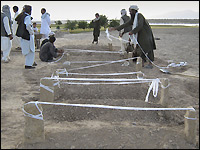Red Cross Officials Confirm Seeing Dozens of Civilian Victims
While U.S. Denies Any Civilian Deaths
<-Afghan villagers looking for other victims in the rubble of destroyed houses Tuesday - One day after U.S. airstrikes in Bala Baluk district of Farah province. AP ![]() More...
More...
 Men mark the burial site for victims of Monday's airstrikes. ->
Men mark the burial site for victims of Monday's airstrikes. ->The Red Cross reported their officials saw women and children among dozens of bodies in two villages targeted in U.S. bombing runs -- AP A former Afghan government official said up to 120 people died in the bombing Monday evening.

A team from the international Red Cross traveled to Bala Baluk district in Farah on Tuesday, where the officials saw "dozens of bodies in each of the two locations that we went to," said spokeswoman Jessica Barry. "There were bodies, there were graves, and there were people burying bodies when we were there," she said. "We do confirm women and children. There were women and children."
<< - Afghan leader Hamid Karzai said civilian casualties from coalition airstrikes would be a focus of his first face-to-face meeting with President Barack Obama on Wednesday.
Karzai has ordered a probe into the killings and the U.S. military sent a brigadier general to Farah to head a U.S. investigation, said Col. Greg Julian, a U.S. spokesman. Afghan military and police officials were also part of the investigative team.
The Afghan president called civilian casualties "unacceptable."
Civilian deaths have caused increasing friction between the Afghan and U.S. governments, and Karzai has long pleaded with American officials to reduce the number of civilian casualties in their operations.
The United States and its allies claim Taliban militants are in the area of civilian homes, thus putting them in danger.
Mohammad Nieem Qadderdan, a former district chief of Bala Buluk, said apporximatley 100 to 120 people had been killed in the attacks. He said villagers were still uncovering bodies, some of them with missing limbs and others were torn into small pieces, he said.
"Our people are still looking through the rubble," Qadderdan said. "We need more people to help us. Many families left the villages, fearing other strikes."
Provincial authorities told villagers not to bury the bodies, but instead to line them up for the officials conducting the investigation to see, Qadderdan said.
Although Islam religion requires Muslims to be burried as soon as possible after death, most of the villagers complied to enable investigators a chance to see first hand, what the air strikes had done to their families.
The fighting broke out Monday soon after the Afghan Taliban fighters massed in Farah province in western Afghanistan, said Belqis Roshan, a member of Farah's provincial council. The provincial police chief, Abdul Ghafar, said 25 military men and three police officers died in that battle near the village of Ganjabad in Bala Baluk district, a Taliban-controlled area near the border with Iran.
Villagers told Afghan officials they put children, women and elderly men in several housing compounds in the village of Gerani, about 3 miles to the east, to keep them safe.
But even though it was known these women, children and elder were all secured in these recognized housing compounds, villagers reported the U.S. aircraft later targeted those compounds, killing almost all of those inside, according to Roshan and other officials.
A Western official in Kabul said Marine special operations forces, which fall under the U.S. coalition, called in the airstrikes. The official asked not to be identified because he wasn't authorized to release the information.
Villagers brought about 30 bodies, including women and children, to Farah city to show the governor Tuesday, said Abdul Basir Khan, a member of the provincial council.
Journalists and human rights workers can rarely visit remote battle sites to verify claims of civilian casualties. United States officials claim the Taliban sometimes force villagers to lie and say civilians have died in coalition strikes. However the international Red Cross report and other official accounts contributed sufficient evidence supporting the villagers' claims in Bala Baluk.
In remarks in the United States on Tuesday, Karzai alluded to the problem of civilian casualties without mentioning the bombing deaths. He said the success of the new U.S. war strategy depends on "making sure absolutely that Afghans don't suffer, that Afghan civilians are protected."
"This war against terrorism will succeed only if we fight it from a higher platform of morality," he said in a speech at the Brookings Institution in Washington. Asked later to clarify, Karzai said, "We must be conducting this war as better human beings" and recognize that "force won't buy you obedience."
An Afghan government commission previously found that an August 2008 operation by U.S. forces killed 90 civilians in Azizabad, a finding backed by the U.N. - The United States originally claimed no civilians had died.
After a high-level investigation it was later determined in fact, at least 33 civilians had been killed. .
After the results were made public regarding the Azizabad killings, the top U.S. commander in Afghanistan, Gen. David McKiernan, announced a directive last September meant to reduce such deaths. He ordered commanders to consider breaking away from a firefight in populated areas rather than pursue militants into villages.



